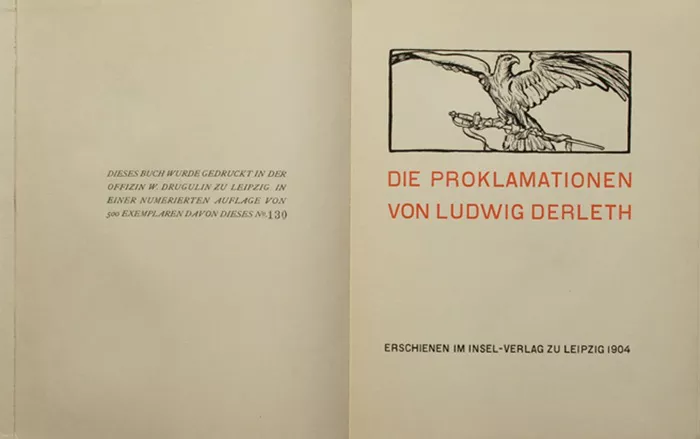Ludwig Derleth, a lesser-known yet profoundly significant 19th-century German poet, occupies a unique place in the literary landscape of his time. His works reflect a fusion of classical influences, modernist experimentation, and deep philosophical inquiry. Unlike many of his contemporaries, Derleth’s poetry was marked by a highly individualistic approach, drawing inspiration from religious mysticism and esoteric thought. His contributions to German poetry merit close examination, particularly when viewed in the context of his more widely recognized peers, such as Stefan George, Rainer Maria Rilke, and Heinrich Heine.
Early Life and Influences
Born in 1870 in Gerolzhofen, Bavaria, Ludwig Derleth was immersed in a rich cultural and intellectual environment from an early age. His education in philosophy, psychiatry, and classical studies shaped the thematic concerns of his poetry. The influences of classical antiquity, German romanticism, and early Christian mysticism are evident in his work.
Derleth’s literary development was closely tied to his engagement with the George-Kreis, a circle of poets and thinkers centered around Stefan George. This group sought to create an alternative to the materialism of the modern world by advocating for a return to aesthetic purity and spiritual depth. Though associated with this movement, Derleth’s poetry took a more introspective and abstract approach, diverging from the more structured aestheticism of George’s work.
Thematic Concerns in Derleth’s Poetry
Derleth’s poetry is deeply philosophical, often grappling with existential and theological themes. His exploration of spirituality stands in contrast to the more human-centered concerns of poets like Heinrich Heine and Friedrich Schiller. While Heine employed irony and political critique in his works, Derleth distanced himself from social commentary, choosing instead to delve into the metaphysical.
His writing frequently reflects an anti-humanistic perspective, portraying the limitations of human understanding in the face of divine mystery. This thematic preoccupation aligns him more closely with the later existential and religious poetry of Rainer Maria Rilke, though Derleth’s language remains more archaic and austere in comparison.
Stylistic Approach and Innovations
Derleth’s style is characterized by dense, symbolic language and an affinity for abstraction. His poetry often employs archaic diction, reflecting his engagement with classical texts and medieval theological writings. Unlike the accessible lyricism of Goethe or the emotional immediacy of Schiller, Derleth’s work demands intellectual engagement from the reader.
His avoidance of traditional narrative structures further sets him apart. Where poets like Rilke infused their verse with personal introspection and vivid imagery, Derleth’s writing leans towards the impersonal and the ethereal. His style, while challenging, offers a unique contribution to German poetry by expanding the boundaries of poetic form and subject matter.
Comparison with 19th-Century German Poets
The 19th century was a transformative period for German poetry, witnessing the transition from Romanticism to Symbolism and early modernist experimentation. In this context, Derleth’s work can be positioned alongside several major figures:
Johann Wolfgang von Goethe: Goethe’s classical sensibilities and humanistic ideals contrast sharply with Derleth’s mystical and anti-humanistic themes. While Goethe sought to harmonize the human and the divine, Derleth emphasized the inaccessibility of the divine realm.
Friedrich Schiller: Schiller’s poetry is driven by ideals of freedom and morality, often engaging with historical and ethical questions. Derleth, by contrast, focused on spiritual abstraction, avoiding overt moralizing.
Heinrich Heine: Heine’s wit and political engagement make him an almost opposite figure to Derleth. Where Heine used poetry as a tool for social critique, Derleth employed it as a means of exploring theological paradoxes.
Stefan George: As a member of George’s literary circle, Derleth shared an interest in aestheticism but diverged in his thematic focus. George’s poetry often celebrated an idealized artistic vision, while Derleth’s work remained more esoteric and mystical.
Rainer Maria Rilke: Perhaps the closest comparison can be drawn between Derleth and Rilke, as both explored existential and spiritual themes. However, Rilke’s work is deeply personal and lyrical, whereas Derleth’s maintains a more austere and impersonal tone.
Legacy and Influence
Despite his significant contributions to German poetry, Derleth remains a relatively obscure figure. His reluctance to engage with mainstream literary movements, combined with the challenging nature of his work, may have contributed to his limited recognition. However, his influence can be detected in later developments in German poetry, particularly in movements that embraced spiritual and philosophical inquiry.
His writing prefigures aspects of modernist poetry, particularly in its rejection of conventional form and its embrace of abstraction. Scholars of German poetry continue to explore his contributions, recognizing his role in expanding the thematic and stylistic possibilities of poetic expression.
Conclusion
Ludwig Derleth’s place in 19th-century German poetry is both unique and significant. His engagement with spirituality, his highly stylized language, and his divergence from the dominant poetic traditions of his time set him apart from his contemporaries. While poets like Goethe, Schiller, and Heine focused on human experience, historical themes, and political engagement, Derleth turned inward, exploring the boundaries of human understanding and the divine.
Though he remains a lesser-known figure, his work continues to be of interest to those who seek a deeper understanding of the philosophical and theological dimensions of German poetry. By revisiting his poetry, scholars and readers alike can gain insight into an alternative trajectory within 19th-century German literature—one that challenges the reader to engage with poetry not as mere aesthetic expression, but as a profound intellectual and spiritual exercise.

